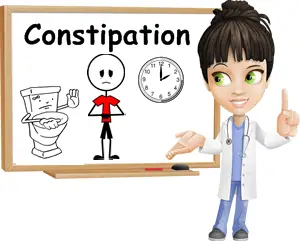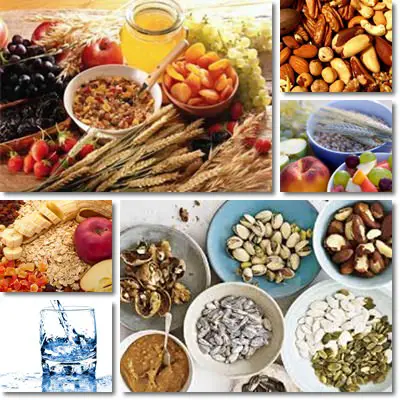Constipation is a common struggle for people nowadays. Whether it’s rare bathroom trips, strenuous or incomplete bowel movements, often accompanied by powerful abdominal cramps, even nausea or dizziness, stools that feel too hard to pass or are clumped together, constipation is a real problem that greatly affects the quality of one’s life. The key to managing, relieving and preventing constipation is understanding what it is, what causes it and how it manifests.
Healthy bowel movements range widely and although you may not feel the need to go have a no. 2 daily, this does not necessarily mean you are constipated. At the same time, although you may go to the bathroom regularly, but your trips are nevertheless far apart, or you may have difficulty passing some stools that are particularly hard, you might find yourself in the constipated range. Generally, the condition is brought about by poor diet and lifestyle habits.

What causes constipation?
The main causes that trigger or worsen existing constipation are:
- Not drinking enough water. Water is needed at the intestinal level to add bulk to stools in order to make them bigger and smoother and thus easier to pass.
- Not eating enough dietary fiber. Fiber is basically plant material we do not digest, but instead use to make our bowel movements bulky enough so that our intestines feel the need to contract to remove them.
- Lack of exercise. Everything in our body moves somehow with the help of muscles. Intestinal muscles, for example, contract to push stools outside the body with the purpose of removing potential toxins. But for them to work properly, we need to exercise and be in good physical health.
- Not having enough healthy oils (fats) in your diet. Our body runs better when we give it generous amounts of healthy (unsaturated) fats such as those in olive oil, flaxseed oil, salmon, tuna, avocado etc. Fats make everything run smoother, especially stools.
- Excessive intake of dairy products. Dairy products such as cheeses, milk or their by-products may cause some individuals to become constipated due to the fact that their body may find them more difficult to digest. An increase in digestion time also means longer transit and can lead to constipation.
- An imbalance in your gut microbiota (gut flora). This is often the result of prolonged antibiotic use, poor hygiene etc. and it influences normal bowel movements to a great extent, causing everything from constipation to diarrhea, bloating and cramps.
- Prolonged use of antibiotics (or other medication such as aluminum-base antacids, some antidepressants, pain relieving medication, laxatives). If you read the prescription information on your medication you may notice it lists mild or chronic constipation as side effect.
- Stress causing changes in your normal routine, eating disorders, lack of physical activity. When we are under a lot of stress, which happens more often than it should, we might skip home cooking and opt for processed foods such as fries or pizza, eat too much of them, sleep in instead of taking a stroll or avoid exercise altogether.
- Disease (problems with the muscles of your digestive tract, intestinal or colon blockage, colon cancer, hypothyroidism, irritable bowel syndrome, pancreas problems or poor bile production). It is always best to seek the advice of a medical professional when dealing with chronic, recurrent and lasting constipation because it may either conceal or precede a more serious medical condition.
While there are rare instances when the condition may worsen to the point where immediate medical attention is needed (blockages, for example), usually both mild and severe or chronic constipation can be successfully treated, managed or prevented with simple dietary and lifestyle changes as well as inexpensive herbal teas and similarly effective and convenient solutions.

What to do about constipation
Knowing what foods to avoid and what foods to eat when constipated can help you have effortless bowel movements and get rid of constipation for good. Here are 6 general guidelines to follow if you are struggling with constipation:
Drink more fluids
Drinking enough water, tea, fruit juices helps add volume to stools and, the bigger the stools, the easier they are to pass because their bulk helps stimulate muscle contractions at the intestinal level. However, remember that when drunk in excessive amounts, liquids become strong diuretics and may contribute to mineral loss and health problems.
Eat more fiber
Go for all kinds of nuts and seeds you like, whole grains, vegetables and fruits with edible skins and peels (that is where they hold most of their fiber content). A good daily intake of dietary fiber helps absorb water, adding bulk to stools which, in turn, makes them easier to pass through the intestines.
Avoid processed foods
Pizza, chips, French fries, candy, meat, white bread, pasta or biscuits, white rice, foods rich in refined sugar and low in dietary fiber and all sorts of processed, ready-to-eat foods promote constipation.
Avoid drinking coffee and alcoholic beverages
Both coffee and alcoholic beverages dehydrate the body, meaning that there is little water left to soften stools. This makes them hard, lumpy, abrasive and difficult to pass. While coffee may send you to the bathroom and allow you to have a bowel movement, it is only a temporary solution that won’t solve your body’s need for fiber, more liquids and healthy fats which are essential for regular and easy to pass bowel movements and GI health.
Exercise
Physical activities of any kind (squatting, running around with a ball, walking) help strengthen the intestinal muscles responsible for the contractions that push stools along the intestinal tract promoting easy bowel movements. Some medical professionals also recommend adopting a squatting position when having a bowel movement, to ease pressure on the colon.
Turn to teas
Herbal infusions made from licorice root, Senna leaves, fennel seeds and leaves, dandelion are all excellent natural laxatives and you should start seeing results as soon as one day or up to one week into the treatment plan. Make sure you are not allergic to any of these plants and remember not to drink more than 1-3 cups of tea a day.
What are normal bowel movements?
Knowing what to do in case you develop constipation is crucial, but so is correctly identifying the condition. For this reason, it is important that you know what it means to have a normal bowel movement as well as what are the most common and less common symptoms of constipation.
So what does it mean to have bowel movements in the normal range? Well, according to available data, normal bowel activity differs from person to person. You can consider yourself in the normal range if:
- Your stools are soft and smooth and, most important, easy to pass (in seconds).
- You experience little or no cramps, little or no strain.
- You have daily bowel movements or as often as 3-4 times a day (usually following main meals) and up to 3 times a week.
- The time between bowel movements does not exceed 3-5 days.
- Your stools are reasonably large (or not visibly small), but soft and smooth on the surface. Find out more about what normal bowel movements are like.
Constipation signs and symptoms
This being said, let’s see what is the textbook definition of constipation and how it presents. Find out below what are the 6 main signs and symptoms of constipation:
Few or no bowel movements
Again, this is different for every individual: while some people might have bowel movements twice a week, others may experience them twice a day. Fewer bowel movements than you are used to having can indicate constipation.
Difficult expulsion of stools
This includes strain (making a great effort trying to push the stool out), swollen abdomen, painful abdominal cramps, exhaustion.
Incomplete evacuation of stools
Constipation looks like incomplete bowel movements, or the feeling that not everything came out, that there is still something left, contributing to discomfort and a feeling of pressure on your gastrointestinal tract. This can compromise colon health in the long run.
Either hard or small stools, or both
When constipated, stools can be sausage-like, lumpy, dry and hard or pebble-like and hard due to the lack of dietary fiber and liquids in your diet. In the second case, there may also be an insufficient amount of stool matter being expelled.
Find out more about pellet or pebble stools.
Unusual symptoms of constipation
Other symptoms of constipation may include dizziness, nausea, hot flashes, chills, sudden and excessive sweating, vomiting, bloody stools. Symptoms like these can be a side effect of straining too much or too hard, the lengthier exposure to dead bacteria or toxins in the stools, the hormonal imbalances causing constipation or advanced hemorrhoids disease (as a result of straining). For more information on less common symptoms accompanying constipation see my article on constipation and feeling unwell.
No gas or flatulence
Intestinal gas is a result of a generous dietary fiber intake and is a normal occurrence. Normally, we might not even notice it and it is problematic to us only when it causes discomfort and pain, but the lack of such manifestations can be a sign we are not having enough fiber in our diet and thus we are prone to constipation.
Conclusion
Knowing what is normal is important, but so is remembering that what is normal for you may not be normal for someone else. If you feel that going to the bathroom two or four times a day is okay for you, meaning you feel good, then you are in the normal range. At the same time, if you only go two times a week, but do so easily, you are good too.
When bowel movements cease to become easy for you, in the sense that you experience irregularities, strain, painful cramps or even dizziness, nausea or fainting or see blood in stools, then you need to address a medical professional to help diagnose you correctly, rule out more serious health concerns and advise you with regards to your treatment options.
